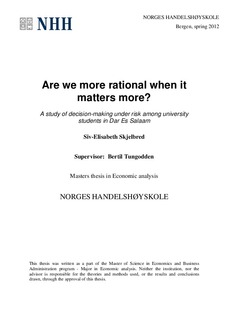| dc.description.abstract | This thesis explores whether there is a difference in the rationality of the decisions at high- and low-stake levels. The rationality of the decisions are measured in two dimensions, the quality of individual decisions, measured by first order stochastic dominance (FOSD), and the quality of a set of decisions, or consistency, measured by the Critical Cost Efficiency Index (CCEI). The thesis introduces the term strict rationality for decisions that are both consistent and non-dominated.
The analysis is based on a lab experiment carried out at University of Dar Es Salaam, Tanzania, in which the participants were bachelor students at the university. The effect of high-stake is studied by a treatment and control experiment, where the treated subjects received higher incentives in a decision making setting than the control group. The lab-experiment uses a graphical tool-kit developed by Choi, Gale, Fishman and Kariv (2007a) designed to investigate the economical preferences of individuals.
The thesis discusses four theories for the effect of incentives: the standard view, the learning view, the effort view and the psychological view. The main finding of this thesis is that high-stake subjects spend on average more time on each decision, which for some subgroups, extravert subjects and low-IQ subjects, translate into more strictly rational decisions. Furthermore the thesis finds that the subjects are in general making quite rational decisions, considering the unfamiliar situation and tool-kit. Furthermore there is a significant learning effect as the subjects make less dominated decisions in the middle decisions than in the early decisions. | no_NO |
